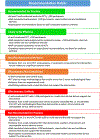Integrative Therapies for Cancer-Related Fatigue
- PMID: 31567463
- PMCID: PMC7388739
- DOI: 10.1097/PPO.0000000000000396
Integrative Therapies for Cancer-Related Fatigue
Abstract
Cancer-related fatigue (CRF) is a common symptom for which cancer patients often use integrative and integrative therapies; however, evidence supporting these therapies is limited. The aim of this review is to provide evidence-based recommendations for integrative interventions during and after cancer treatment for CRF. These recommendations are based on a systematic literature review from 1990 through 2019. Cognitive behavior therapy plus hypnosis and American ginseng can be considered during active treatment, and acupressure, mindfulness-based cognitive therapy, and qigong/tai chi easy can be considered during posttreatment. Coenzyme Q10 and L-carnitine are not recommended during active-treatment. All other integrative therapies for CRF had insufficient evidence to make a recommendation. While there is increasing evidence for integrative therapies for CRF, because of lack of rigorous trials and replication, no therapies could be definitively recommended. Further rigorously designed integrative therapy research is needed and should consider implementation and dissemination.
Figures
References
-
- Kirshbaum M Cancer-related fatigue: a review of nursing interventions. Br J Community Nurs. 2010;15:214–219. - PubMed
-
- Wu HS, Harden JK. Symptom burden and quality of life in survivorship: a review of the literature. Cancer Nurs. 2015;38:E29–E54. - PubMed
-
- Berger A, Mooney K, Alvarez-Perez A, et al. NCCN: Cancer-Related Fatigue, Version 1.2016. Fort Washington, PA: National Comprehensive Cancer Network; 2016.
Publication types
MeSH terms
Grants and funding
LinkOut - more resources
Full Text Sources
Medical





